At our Child Counselling Therapy, we understand the profound impact trauma can have on children. Our therapy sessions provide a safe and supportive space for healing. Using trauma-informed practices, we help children express their emotions and build resilience. Techniques such as play-based therapy and art interventions are key in encouraging emotional expression and helping kids process their experiences. We also involve families in the therapeutic process, fostering understanding and support for everyone involved. Our goal is to empower children and their families with the tools they need to thrive. Together, we can navigate the path toward emotional growth and stability, and there’s so much more we can achieve on this journey.
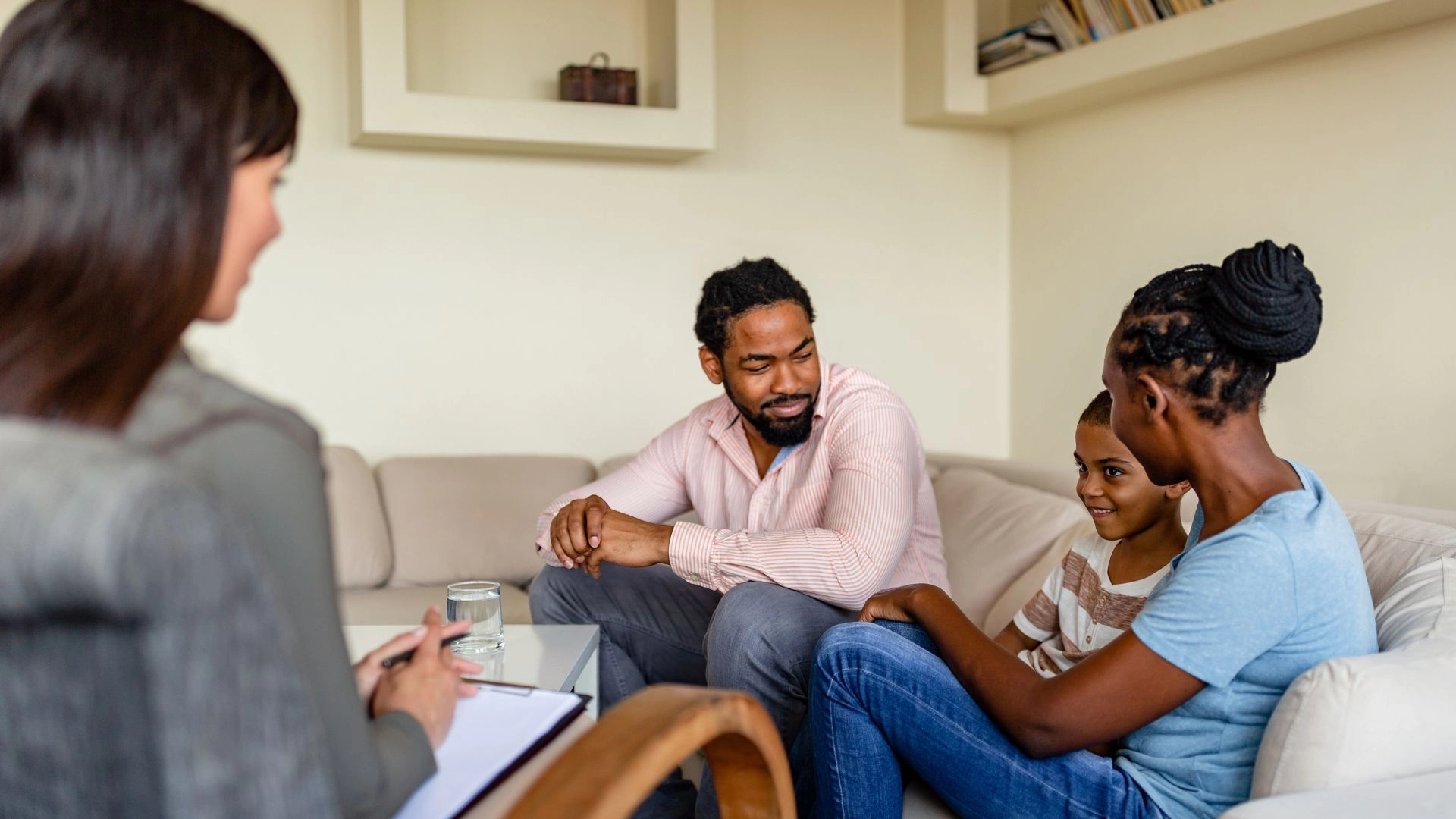
About Child Counselling Therapy
Child counselling therapy is a supportive space where we can help children express their feelings and navigate challenges in a safe and understanding environment. As child and adolescent counsellors, we utilize various approaches, including trauma-informed therapy, to guarantee that each child feels heard and validated. Our aim is to foster emotional resilience, equipping children with the tools they need to cope with life’s difficulties.
We understand that family dynamics can markedly impact a child’s mental health, which is why we also offer therapy for family issues. Through these therapeutic interventions, we endeavor to create a nurturing environment where emotional support in families is prioritized. Whether it’s behavioral therapy or psychological therapy, our methods are designed to meet each child’s unique needs.
Moreover, we emphasize mental health awareness, recognizing that early intervention can lead to lasting positive outcomes. By engaging with children in a compassionate manner, we help them build trust and openness, setting the stage for meaningful progress. Our goal is to guide them towards a healthier emotional state, empowering them to thrive both individually and within their families. Together, we can make a considerable difference in their lives.
Understanding Childhood Trauma and Its Impact
Understanding childhood trauma is essential, as its effects can deeply influence a child’s emotional and psychological development throughout their life. We often see how trauma manifests as anxiety in children, impacting their mental health and overall well-being. In these instances, child counselling therapy becomes vital, providing a safe space for children to explore their feelings.
Trauma therapy focuses on helping children develop emotional regulation skills, offering them calming techniques to manage overwhelming emotions. An emotional resilience specialist can guide children in building coping strategies that foster recovery and growth. This is particularly important as family dynamics can play a significant role in how trauma affects a child.
We must recognize that unresolved trauma can lead to ongoing stress, making therapy for stress essential. Psychotherapy for anxiety helps address these challenges, equipping children with tools to navigate their feelings more effectively. By understanding the impact of childhood trauma, we empower ourselves and our children to seek the support they need, ultimately fostering healthier futures. Together, we can make a difference in their lives, ensuring that they learn to thrive despite their experiences.
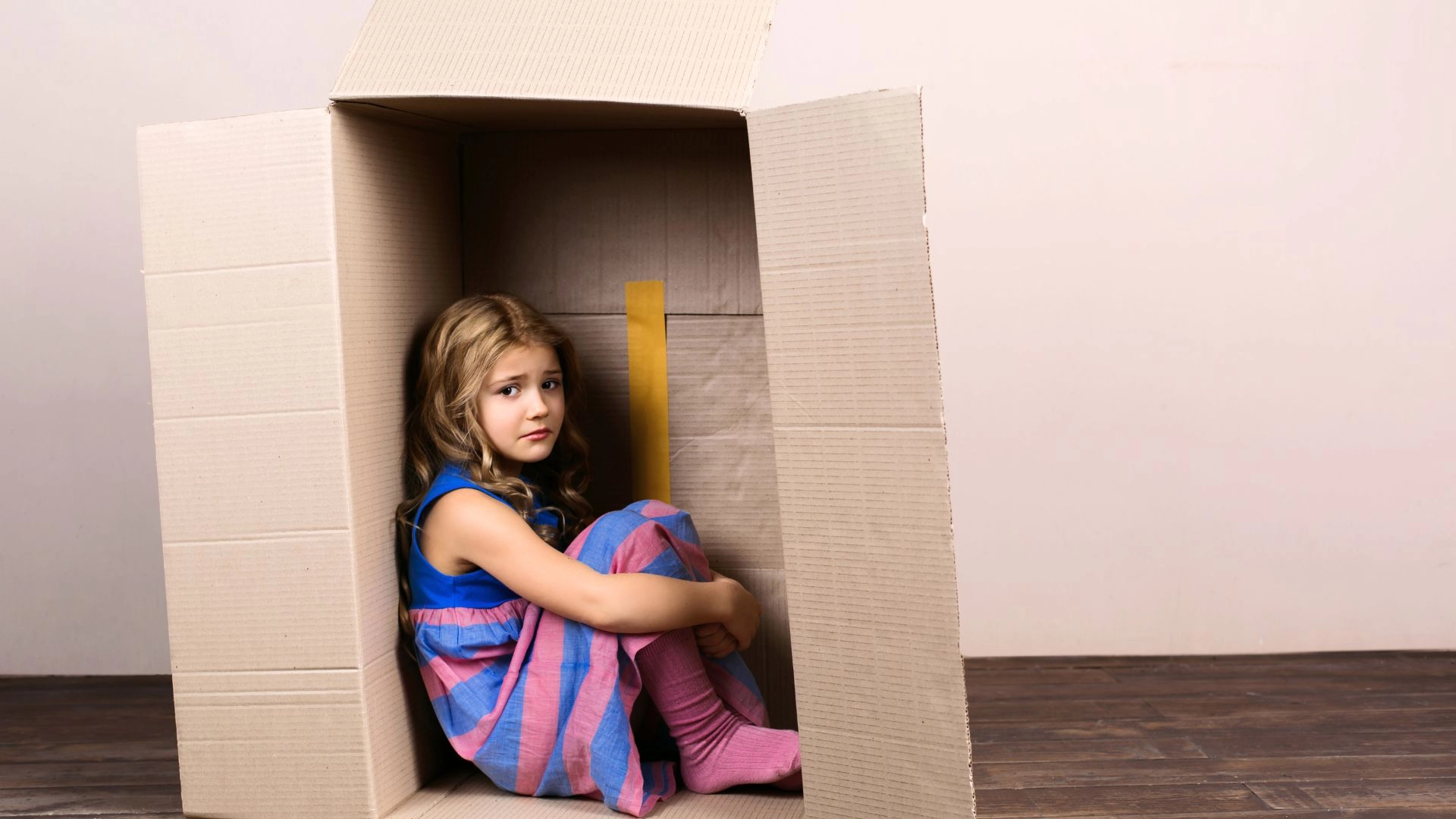
Child Therapy Techniques for Trauma Recovery
When it comes to trauma recovery, we can explore various child therapy techniques that foster healing and resilience in a supportive environment. One effective approach is child counselling therapy, which focuses on enhancing emotional well-being through therapeutic counselling tailored to each child’s unique needs.
Incorporating holistic therapy approaches, we can engage children in creative activities like art and play therapy, helping them express their feelings and experiences. These child therapy techniques not only promote healing but also develop coping mechanisms that empower children to manage their emotions better.
For those dealing with anxiety, anxiety therapy can be particularly beneficial, providing strategies to alleviate distress and build confidence. We also recognize the importance of providing support for parents, helping them understand their child’s journey and equipping them with tools to foster a nurturing environment.
Collaborating with a mental health professional guarantees that we create a safe space for children to explore their emotions, leading to lasting trauma recovery. By using these techniques, we can truly make a difference in a child’s life, guiding them towards a brighter, more resilient future.
Trauma-Informed Care in Child Counselling
Incorporating trauma-informed care into child counselling is essential for creating a safe and supportive environment where children can heal and thrive. By understanding the impact of trauma on a child’s emotional and mental wellness, we can tailor our child counselling therapy to meet their unique needs. This approach helps us recognize anxiety symptoms and develop effective anxiety treatment plans that include anxiety coping strategies.
In our sessions, we focus on emotional therapy that fosters trust and connection, enabling children to express their feelings without fear. We also encourage parent-child therapy to strengthen family bonds and enhance communication, which is crucial for healing. Through family therapy techniques, we can address the dynamics that contribute to a child’s stress and anxiety, promoting collaborative stress management among family members.
Play-Based Therapy for Healing Childhood Trauma
Building on the foundation of trauma-informed care, play-based therapy offers a unique and engaging way for children to process their experiences and emotions related to trauma. This form of child counselling therapy recognizes that kids often express themselves better through play than through words. By incorporating therapeutic play, we create a safe space where children can explore their feelings and begin their journey toward healing childhood trauma.
Through play-based therapy, a licensed counsellor can help children understand and manage anxiety in families, fostering emotional well-being and resilience. This method allows children to act out scenarios that reflect their experiences, enabling them to confront and make sense of their feelings. As they engage in play, they learn coping skills and develop a stronger sense of self, which are essential for child mental health and childhood trauma recovery.
We know that the process can be complex, but by utilizing play as a tool, we empower children to reclaim their narratives. Ultimately, play-based therapy not only aids in trauma therapy but also nurtures a child’s emotional and psychological growth, setting the stage for a healthier future.
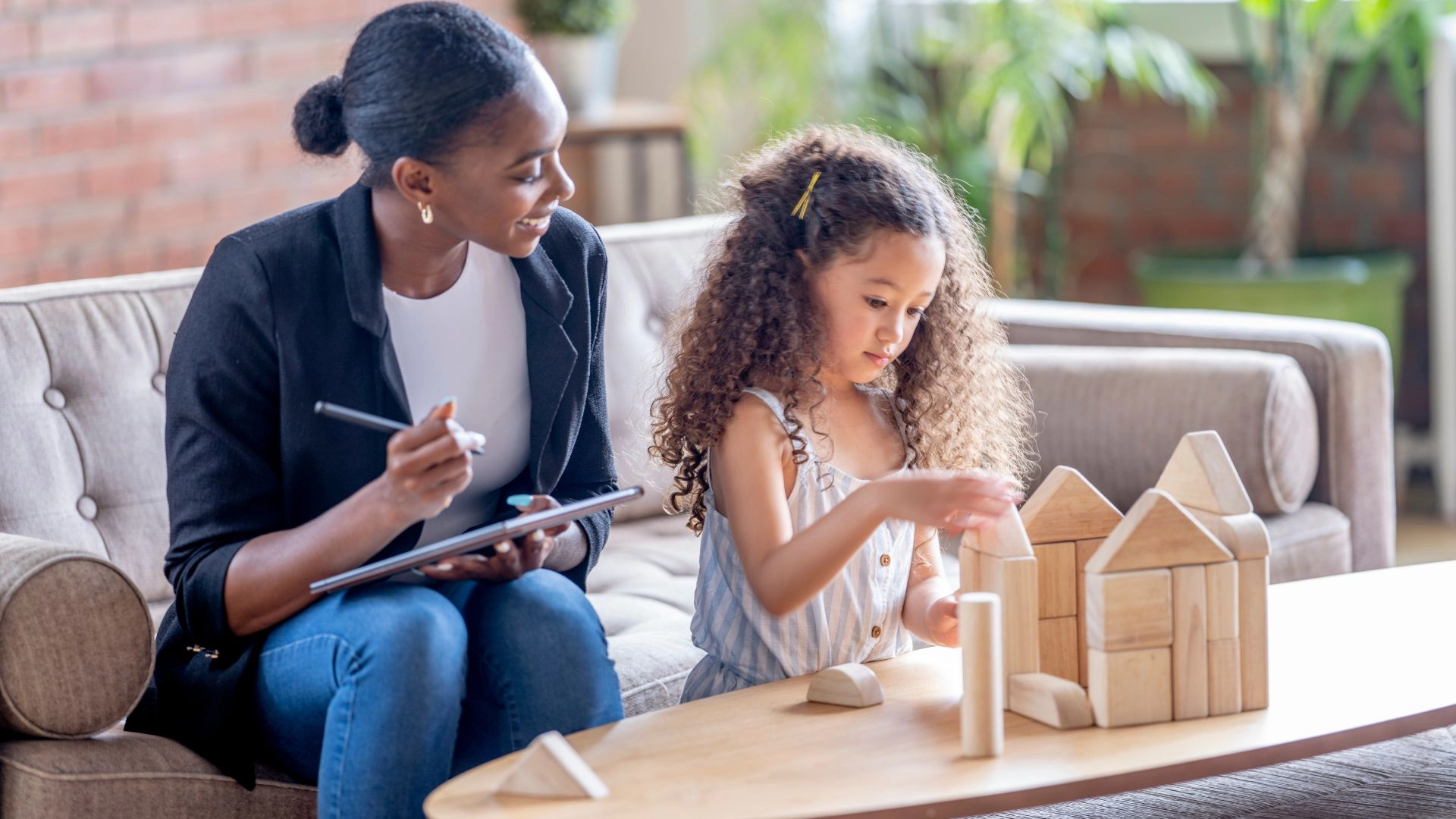
Emotional Support and Regulation in Children
Understanding and nurturing emotional support and regulation in children is essential, as it helps them navigate their feelings and develop resilience in the face of life’s challenges. In child counselling therapy, we focus on providing that support, enabling children to express their emotions safely. We recognize that trauma can lead to anxiety, and through effective anxiety management techniques, we can help them identify their feelings.
Using grounding techniques, children learn to stay present and calm, which is vital for stress reduction. We often incorporate relaxation techniques during our anxiety therapy sessions, allowing them to experience peace amid chaos. An anxiety symptoms checklist can also be a useful tool, helping children recognize and articulate what they’re feeling.
As we guide them through trauma recovery, we emphasize the importance of emotional support and validation. By fostering an environment where children feel heard and understood, we’re laying the groundwork for their emotional regulation skills. This holistic approach not only aids in their current struggles but also equips them with tools for future challenges, ensuring they grow into resilient individuals capable of managing stress and anxiety effectively.
Cognitive-Behavioral Therapy for Children with Trauma
Cognitive-Behavioral Therapy (CBT) provides a framework for helping children process trauma by addressing the thoughts and behaviors that arise from their experiences. In this context, we engage with a cognitive-behavioral therapist to explore effective anxiety treatment options tailored to meet each child’s needs, especially in cases of anxiety disorders in teens.
In trauma therapy, we focus on identifying negative thought patterns and replacing them with healthier perspectives. This approach not only aids in anxiety reduction techniques but also fosters the development of vital communication skills therapy that can help children express their feelings more openly.
Additionally, grief counselling is integrated when necessary, supporting children who have faced significant loss. We believe in the importance of family mental health, and therefore, we encourage family support programs to create a safe environment for healing. Parental guidance plays an essential role in this process, helping caregivers understand their child’s emotional landscape and reinforcing the skills learned during therapy. By working together, we can empower children to navigate their trauma, fostering resilience and promoting overall well-being.
Parent-Child Therapy for Trauma Healing
Healing together through parent-child therapy offers an essential opportunity for families to reconnect and address the trauma that affects their relationships. In these therapy sessions, we can explore the impact of trauma on both children and parents, recognizing how it creates anxiety in adults and children alike. By engaging in parent-child therapy for trauma healing, we can improve our family emotional well-being and strengthen our relationship dynamics.
Holistic family therapy approaches allow us to understand each other’s experiences and feelings, fostering a safe space for open dialogue. This openness is vital for conflict resolution in families, as we learn to communicate more effectively and empathetically. Through this process, we can support our children’s adolescent mental health while also addressing our own emotional needs.
As we navigate the challenges of trauma, anxiety counselling can be integrated into our sessions to help us manage stress and anxiety together. By working collaboratively, we can create a nurturing environment that promotes healing, resilience, and stronger bonds. Ultimately, parent-child therapy is not just about addressing trauma; it’s about building a healthier, more connected family unit for the future.
Group Therapy for Children: Building Resilience Together
Group therapy for children provides a supportive environment where they can share their experiences and build resilience together. In these sessions, we create a safe space for kids to explore their feelings about trauma, helping them understand they’re not alone. By participating in group therapy, children can develop coping skills and connect with peers facing similar challenges.
We often integrate anxiety support groups into our program, allowing kids to learn from one another and share their journeys. With the guidance of a relationship counsellor, we can tailor an anxiety treatment plan that meets each child’s unique needs. Family-focused therapy and family therapy approaches enhance these sessions, encouraging parental involvement and effective parenting strategies.
Through crisis intervention therapy, we address immediate concerns while fostering long-term resilience. Children learn to express their emotions and support one another, equipping them with tools to navigate life’s challenges. Ultimately, group therapy empowers our children to build connections, enhancing their emotional well-being and instilling a sense of hope. Together, we’re not just healing from trauma; we’re building a stronger, more resilient future.
Addressing Anxiety and Depression in Children After Trauma
After experiencing trauma, many children face heightened anxiety and depression, and it’s crucial that we provide them with the support they need to navigate these challenges. We must understand that anxiety disorders and depression in families can ripple through everyone, affecting the overall family wellness. Through child counselling, we can offer targeted anxiety therapy and trauma therapy, helping our children find effective anxiety relief and stress relief.
Working with a qualified psychotherapist, we can explore strategies tailored to each child’s unique needs. It’s essential to create a safe space where they can express their emotions and fears. By integrating techniques from both couples therapy and family wellness programs, we can strengthen family bonds and guarantee everyone feels supported.
As we begin this journey, let’s remember that healing takes time. We should celebrate small victories and encourage open communication, allowing our children to voice their concerns. This supportive approach can considerably alleviate symptoms of anxiety and depression, fostering resilience and hope for a brighter future. Together, we can guide our children through these tumultuous times and help them reclaim their joy and sense of security.
Early Intervention Therapy for Childhood Trauma
Early intervention therapy plays an essential role in addressing childhood trauma, allowing us to provide our children with the support they need right from the start. By engaging in child counselling therapy early on, we can help our little ones process their experiences and develop healthy coping mechanisms. This proactive approach fosters resilience and encourages emotional growth.
Working with a family therapist can be particularly beneficial as they guide us through family systems therapy, ensuring that we address the trauma within the context of our family dynamics. Family communication therapy can enhance our understanding of each other’s feelings, helping us create a safe space for open dialogue. Parenting coaching equips us with effective strategies for nurturing our children’s mental health, while family conflict management techniques can reduce tension and promote harmony.
Incorporating family behavioral therapy into our routines supports not just the child but the entire family unit, fostering a culture of healing and understanding. Ultimately, prioritizing family mental health care is vital in overcoming trauma. Together, we can help our children thrive, ensuring they feel supported and loved every step of the way.
Art Therapy and Creative Interventions for Children
Art therapy and creative interventions often provide children with a unique way to express their feelings and experiences, allowing us to connect with them on a deeper level. Through these therapeutic techniques, we can help children navigate their trauma and anxiety, fostering emotional expression in a safe environment.
In child counselling, art therapy becomes a powerful tool. By engaging in activities like drawing, painting, or sculpting, children can communicate feelings they might not have the words for. This creativity not only aids in processing their experiences but also promotes a sense of control and empowerment, essential for their healing process.
Play therapy, another effective creative intervention, encourages children to express themselves through play, which is natural and intuitive for them. It allows us to observe their interactions and emotions, revealing underlying issues that might need attention.
School Counseling and Support for Traumatized Children
Supporting traumatized children in a school setting is essential, as it provides them with a safe space to heal and thrive amidst their challenges. School counseling plays a significant role in this process, offering tailored support for each child’s unique needs. We recognize that many of these children struggle with anxiety triggers that can stem from past trauma, making effective intervention imperative.
By working with an anxiety therapist, we can help identify and address anxiety diagnoses, allowing children to navigate their feelings in a constructive way. Exposure therapy can be particularly beneficial, gradually exposing children to their fears in a controlled environment. This, combined with relaxation exercises, equips them with tools for managing anxiety and fosters self-care for anxiety.
As we promote anxiety recovery, it’s also important to involve family counseling services when appropriate. This collaborative approach guarantees that families are supported, helping children feel secure and acknowledged. Together, we can create an environment where traumatized children are not just surviving but truly thriving, empowering them to rebuild their lives with resilience and hope.
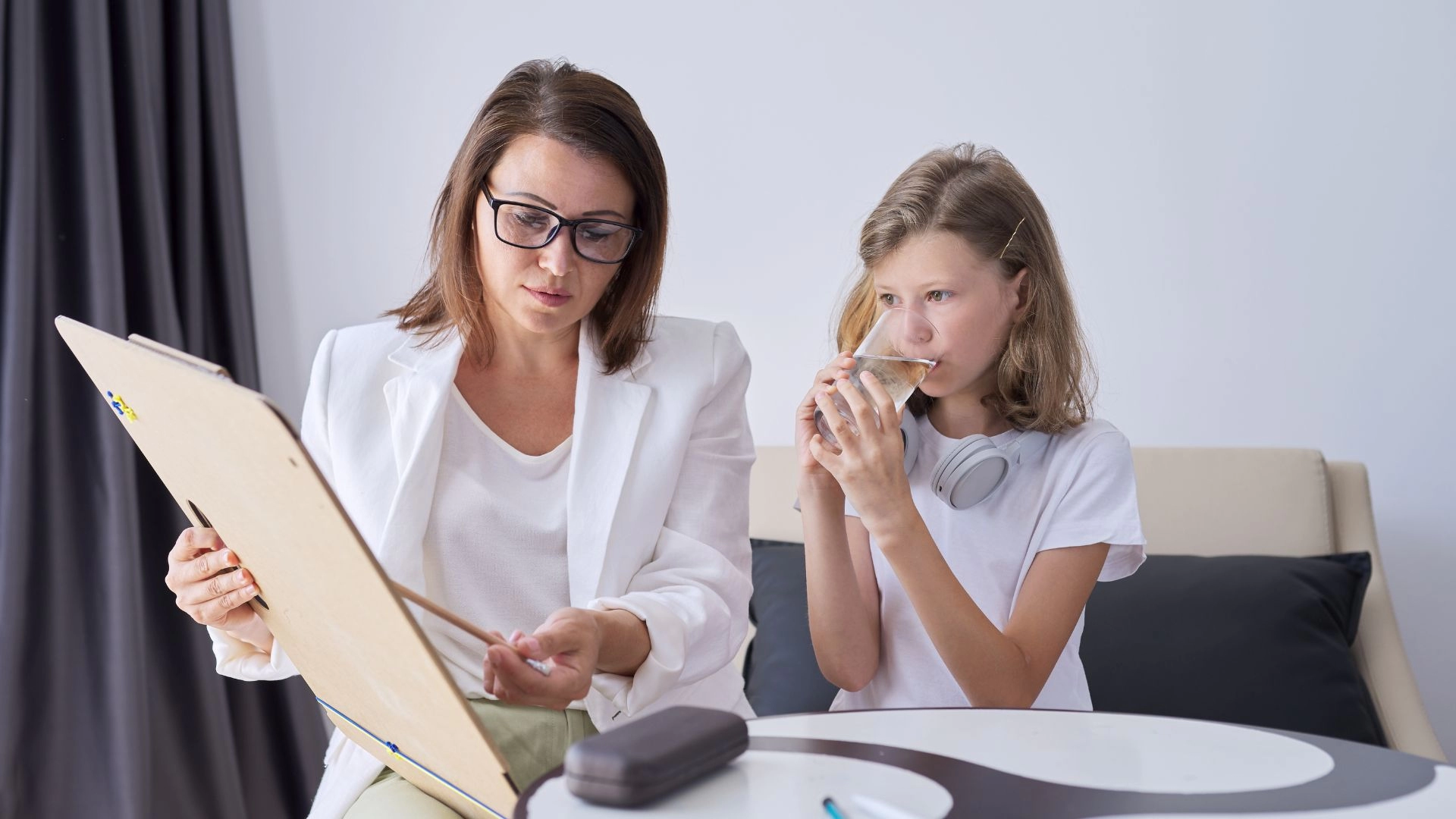
Family Therapy for Comprehensive Trauma Recovery
Family therapy can be an essential component in the journey toward thorough trauma recovery, fostering understanding and healing within the family unit. Through marriage and family therapy, we can address the complexities of family dynamics that often arise after trauma. This process involves family-centered counselling, where we work together to identify and strengthen bonds, promoting healthier communication and emotional support.
Parental counselling plays a pivotal role, equipping caregivers with the tools to nurture their children through difficult times. Sibling therapy can also be valuable, as it helps siblings support each other while maneuvering their shared experiences of trauma. Couples and family therapy create a safe space for everyone to express feelings, facilitating family relationship building and fostering resilience.
Integrative family therapy approaches combine various techniques, ensuring that all family members are included in the healing process. By participating in this shared journey, we can create an environment of family healing, where every voice matters. Together, we’re not just addressing individual pain; we’re building a foundation for lasting recovery that strengthens the entire family unit.
Connect with Our Child Therapist for Expert Trauma Care
As we continue to emphasize the importance of healing within the family unit, connecting with our skilled child therapist can provide the expert trauma care needed to guide you through this journey. Our approach focuses on the family therapy process, which helps address the unique dynamics of your family while also supporting individual needs.
At our Child Counselling Therapy Center, we understand that trauma can impact not only your child but the entire family. Our marriage and child therapist will work with you to explore these effects and how they manifest in anxiety and depression. We offer effective strategies for nervous system regulation, including calming exercises and anxiety prevention techniques, aimed at reducing excessive worry and shifting negative thought patterns.
Our therapy sessions create a safe and supportive environment where every family member feels heard and understood. Together, we will work towards building healthier communication and coping mechanisms, fostering resilience within your family. By partnering with our family therapist, you’re making a valuable investment in your family’s emotional well-being and growth. Let’s embark on this healing journey together, ensuring a brighter and more stable future for everyone involved.
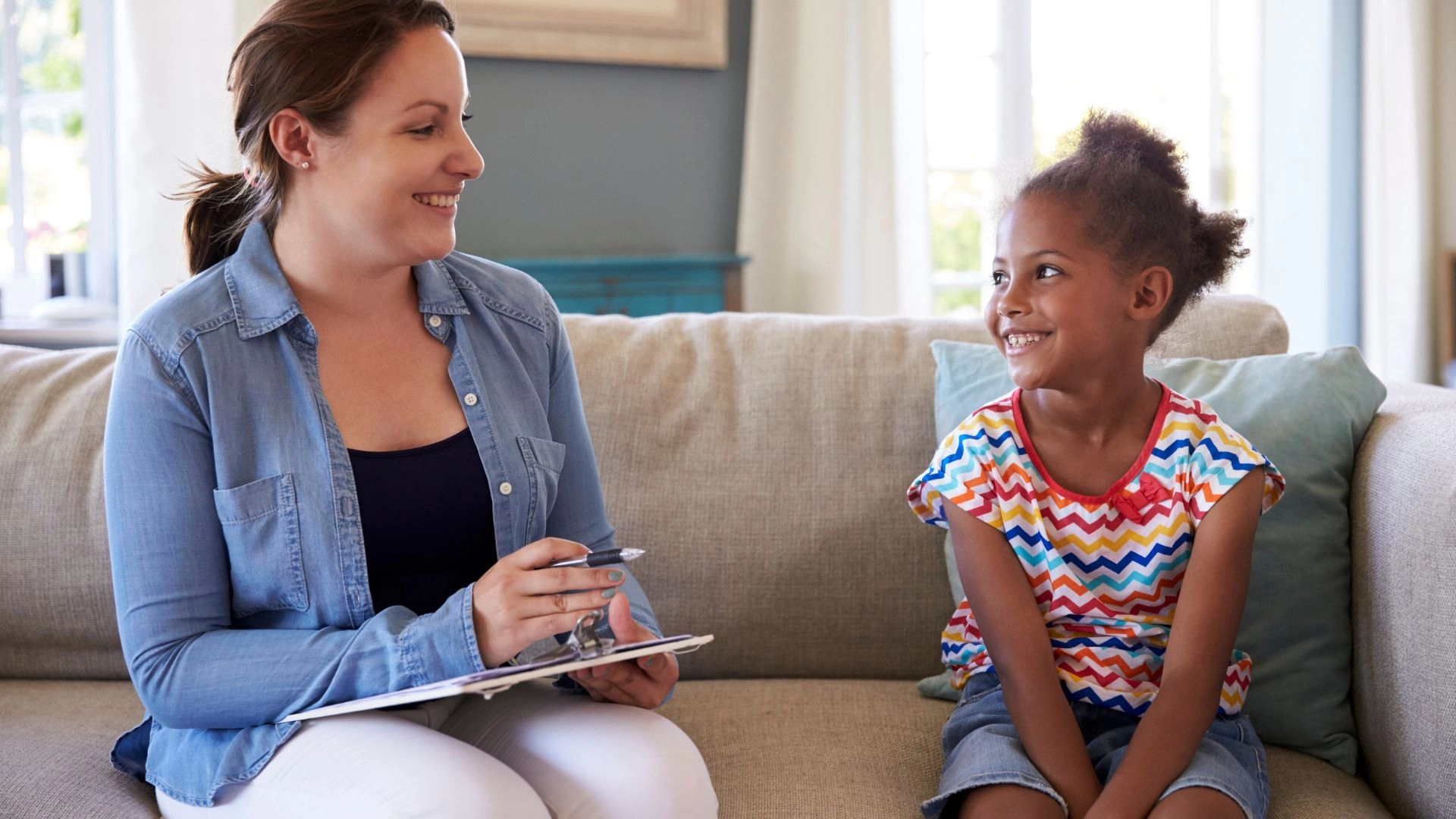
Frequently Asked Questions
How Can I Tell if My Child Needs Counseling?
When we’re wondering if our child needs counseling, it’s important to look for changes in their behavior, mood, or social interactions. If they’re showing signs of withdrawal, anxiety, or unexplained anger, it might be time to contemplate support. We should also trust our instincts—if we feel something’s off, it’s worth exploring. Remember, seeking help is a sign of strength, and it can make a significant difference in our child’s well-being.
What Qualifications Should I Look for in a Child Therapist?
When we’re seeking a child therapist, we should look for someone with relevant qualifications, like a degree in psychology or social work. It’s important they have specialized training in child development and counseling techniques. We’ll also want to take into account their experience working with children, especially in areas that align with our child’s needs. Finally, creating a supportive environment is essential, so we should seek a therapist who’s approachable and compassionate.
How Long Does Child Counseling for Trauma Typically Take?
When we think about the duration of counseling, it really varies based on individual needs and circumstances. Typically, we might expect a few weeks to several months of sessions. It’s important to remember that everyone’s journey is unique, and some may need more time to heal than others. We should prioritize our comfort and progress, and trust that our therapist will guide us through the process at a pace that feels right for us.
Are There Any Potential Side Effects of Child Counseling?
When we think about counseling, it’s natural to wonder about potential side effects. While most people experience positive changes, some might feel emotional discomfort or increased anxiety initially. It’s important to remember that these feelings often indicate progress as we work through difficult issues. We should always communicate openly with our counselor about any concerns. Together, we can navigate these challenges and focus on the healing journey ahead.
How Can I Support My Child During Therapy Sessions?
Supporting our child during therapy sessions involves being present and attentive. We can show our love by listening to their feelings and encouraging open communication. Let’s reassure them that it’s okay to express emotions and that we’re proud of their courage. We can also collaborate with the therapist to understand how best to support our child outside of sessions, ensuring they feel secure and understood throughout this journey.
